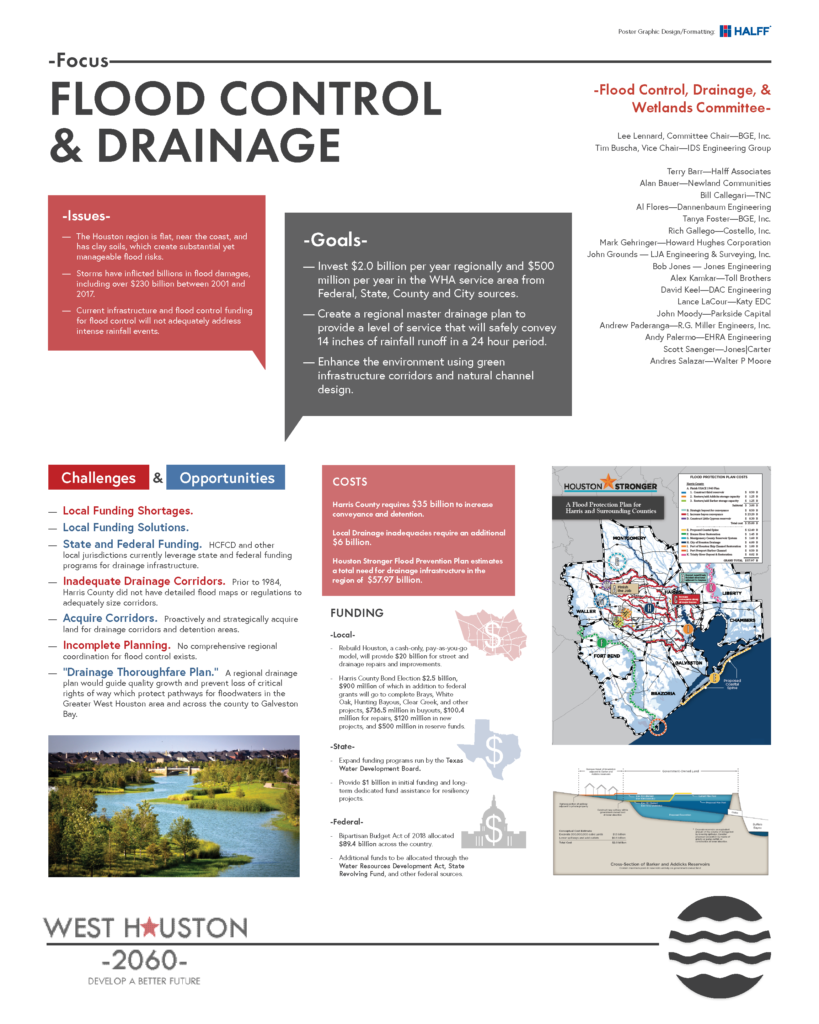Flood Control in 2060
We have just published our West Houston 2060 Plan and in it we tackle some of the challenges and opportunities the region may face when reaching the year 2060. Below is the committee’s event board which gives an overview of the plan section, but click the title above to view the entire committee section and for a complete version of the 2060 plan.
CYPRESS CREEK OVERFLOW MANAGEMENT STUDY UNDERWAY
The West Houston Association is participating in a new evaluation of Cypress Creek watershed overflows in the area south of the creek as it enters Harris County from Waller. Harris County Flood Control has established a website for the public to track progress of this evaluation here.
CHARTING BUFFALO BAYOU | HCFCD HAS DELAYED THE FINAL REPORT FOR 32 MILES FROM BARKER RESERVOIR TO THE TURNING BASIN
Harris County Flood Control District has big delayed the study of drainage capacity of Greater West Houston’s Buffalo Bayou from Barker Reservoir to the Houston Ship Channel Turning Basin, a distance of 32 miles and 7 miles of White Oak Bayou. The plan seeks to integrate reduced flooding risks and damages and the need for stream bank stabilization with opportunities for third parties to collaborate in creating community and environmental enhancements. The plan is ready for feedback from the public after which a final report recommending action will be completed. See the external link at the right for more information.
GREATER WEST HOUSTON’S INFRASTRUCTURE IS MOSTLY NEW BUT SOME AREAS NEED REBUILDING
The West Houston Association advocates aggressively for state of the art new and rebuilt drainage and flood control systems that meets the needs of a growing Greater West Houston. The Association strongly supports the REBUILD HOUSTON program.
GWH area flood control systems are becoming a model for addressing growing suburban locations. Harris County Flood Control District (HCFCD) has implemented the “Frontier Channel” flood control program on Langham Creek, with the best characteristics of quality growth meeting a critical public need in a cost-effective manner. South Mayde and Little Cypress Creek are the next watersheds to be addressed. The concept institutes “linear”, “on-line” detention as opposed to traditional “off-line” systems and will be financed through development impact fees. The system will include active open space and park land in addition to performing their drainage function.
City System Rebuilding: City of Houston drainage systems are recognized as old and in need of updating. A proposal for a City Charter Amendment has been advanced as a ballot measure in November, 2010 that would establish a dedicated fund for drainage and roadway improvements. If passed, this fund would include a drainage fee on existing residential and commercial properties in the City of Houston and an impact fee on new development in the City of Houston in addition to capturing a portion of the City’s ad valorem tax currently servicing debt on bonds for these improvements after existing bonds are paid off.

